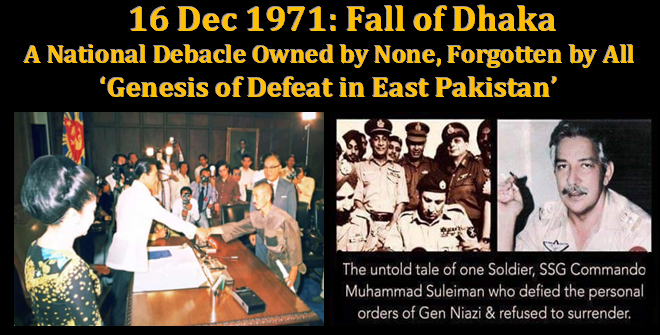Dr Shakir A Shahid
World War II was over — but not for Mr. Hiroo Onoda — a lieutenant in the Imperial Japanese Army, because he did not believe that the war had ended and considered it as enemy propaganda. Actually, the young soldier had orders not to surrender—a command, he obeyed for nearly three decades until 1974. He spent an additional 29 years hiding in the jungle of an isolated Philippine island and being an intelligence officer kept waging guerilla warfare. Finally, his ageing former commanding officer travelled to the Philippines to rescind his original orders in person and then Mr. Onoda emerged from the Jungle to hand over his Samurai sword while still wearing a tattered army uniform.
In contrast to the one-man army of Hiroo Onoda, around 3500 Km away from Philippine, two powerful armies were also fighting a war. Eastern Command of Pakistan Army had four Divisions (approx 90,000 Troops) and two Independent Infantry Brigades (approx 10,000 Troops); while on the other hand, India came in with seven Divisions, three Independent Infantry Brigades and several Mukti Vahini Brigades (approx 80,000-100,000 heads). Mukti Vahini (Bahni) was carrying out attacks on Pakistan Army with the support of East Pakistan Rifles and local Police as Bengali officers had mutinied under the command of Maj. General Osmani.
In East Pakistan PAF had only one squadron of 12 F-86 Sabres while the Indian Air Force consisted of 10 Squadrons (approx 150 Aircrafts). Due to lack of High Range Radar, which could see beyond 25 miles, PAF pilots had only Four minute scramble time to intercept enemy planes. There was a single base with a single runway protected by Light Anti Aircraft Artillery, which was not sufficient to provide protection against Indian Bombers. Consequently, by 06 Dec 1971, the entire PAF, consisting of remaining 09 planes, was grounded owing to extensive cratering of the Dhaka runway by IAF bombers. With the loss of air space, the ground formations of Pak Army became sitting ducks for IAF bombers.
In East Pakistan, a sporadic and dispirited resistance was put against Indian assault. Major Fortresses of Jessore and Jhendiah and Brahmanbaria were abandoned without a fight. Due to multiple factors various Brigades could not put up a determined battle. Some got trapped in encirclements, while some got disintegrated due to unending ambushes. However, 205 Pak Brigade gave a determined battle in Hilli. During all these demoralizing times, CO of 2nd Commando Lt. Col Suleiman shall be remembered forever for his gallantry and refusal to obey the order of surrender in 1971 in East Pakistan. When reminded about following the order of senior, Suleiman replied ‘you have no moral authority for giving me an order as you have surrendered’.
Actually, Eastern Command of Pak Army failed to anticipate an all out Indian Invasion despite heavy Indian build up around the border, and consequently no preparations were made beforehand to face Indian attack. Brave soldiers of Pakistan could have defended Dhaka for more than three months, if the battle strategy was revised well in time. However, this was not just the failure of Eastern command, but also the grand concept that ‘Defense of East Pakistan lies in West Pakistan’ also failed. The idea was to gain Indian Territory in the West to compensate for the territory lost in East Pakistan. However, Western Front was opened with delay and in a half hearted and hesitant manner. As a result, nothing appreciable like Amritsar or Jammu could be captured while the Indians had almost captured Dhaka including most of the countryside.
In East Pakistan, Pak military fought with valor and gallantry in all spaces, but unfortunately, Pakistan had lost this war much before its start. Under representation in the assembly, civil services, the military and the national budget had poisoned the minds of people of East Pakistan beyond any reversibility. Despite East Pakistanis comprising the majority (56%), they were given the same number of seats in the assembly as West Pakistan. Politicians from West Pakistan equally played their part in the final breakup of Pakistan. There are serious indications that Sheikh Mujib-ur-Rahman did not want to secede from Pakistan. His words are on record, which he uttered after his release from jail in 1969, “We are in the majority, why should we secede?”
Pakistan could have remained united if its rulers, sitting in West Pakistan, had accepted Sheikh Mujib-ur-Rahman as the prime minister, which was his legal right as his party had won the 1970 Elections. However, the leader of the party who won in Punjab and Sindh, did not agree to recognize Mujib-ur-Rahman as the prime minister of the Pakistan, and refused to attend the National Assembly session, which was to be held in Dhaka, So much so that he threatened to break the legs of his elected party members if they dared to go to Dhaka. After a deeper analysis, it is revealed that the debacle of East Pakistan happened due to failure of elites of West Pakistan, whether political or non-political.
In contrast to East Pakistan, the West Pakistan was a hub of the elites of kinds—agricultural, bureaucratic, religious, intellectual, industrial, and military. This oligarchy of elites forwarded their own agendas and consequently pro-elite agenda dominated in all domains of public policy in united Pakistan. All growth and development were happening in West Pakistan, with the result that people of East Pakistan started feeling completely abandoned and marginalized. This feeling of marginalization and exploitation kept on developing like the magma of a volcano, which finally erupted in 1971. Soldiers can fight with enemies on the ground, but not with poisonous feelings infiltrated into the soil and air of a country; hence, Pak military was fighting a war which had been lost already.
Elites are present all over the world in all societies, nations and countries; however, elites of West Pakistan and now of present Pakistan are like a pool of deoxygenated stagnant water without any provision of recycling with fresh intake. Instead, this self-serving oligarchy of elites, consciously or unconsciously, opts to choke all opportunities of development in non-elite strata to prevent their entry into elite ranks. There is always a musical chair of power played between agricultural-feudal elites and non-agricultural elites with backing of uniformed elites while the religious and bureaucratic elites keep changing their side as per convenience. Probably its historical memory, wired in the epigenetics of the people of this area, which makes them so prone to all sorts of corruption.
While making attribution to India it should be remembered that only stupid cowards complain of their enemies. Hence, India should not be blamed much for the armed attack on Pakistan. India is an enemy of Pakistan and shall remain so for next 300 years at least till the collective memory of Indian establishment realizes that geographic roots of their animosity toward Pakistan have lost relevance in the face of newly emerged virtual realities. Before this realization India shall always capitalize on every available opportunity to damage and dampen Pakistan. Hence, every sensible Pakistani, without being overly reactive, should keep himself prepared to defend the remaining Pakistan.
— Dr. Shakir Ahmad Shahid, P.S.P, is Postdoct Fulbright Alumnus in Forensic Science, who has served in various fields like Policing, Investigation, Intelligence and Counter-Terrorism on Policy and Operational levels as a Senior Police Officer and Director (counter terrorism). Dr Shahid holds the degree of Doctor of Philosophy in Chemistry, along with research publications in the fields of bio-materials, bio-energy, and forensic spectroscopy. In addition to degrees of Master in Psychology, M.Sc Chemistry, L.L.B, B.Sc (Biology), he is Ph.D Research Scholar in Criminology, and a passionate researcher in theoretics of Complex Systems, Negentropes, Socionics, Suicide, Homicide, Social behavior Re-engineering, National narrative, Policing, Intelligence, Governance, National security, Electro-magnetic spectrum, and Forensic evidence. He can be reached at [email protected]; drshakirahmad.medium.com; drshakirahmad.com



